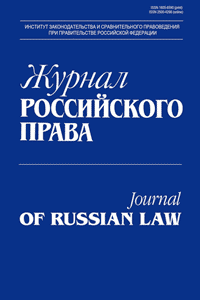The number of European countries which have included into their national legislation the provision on criminal liability for legal persons (corporations) has been continuously growing. The following countries remain essential supporters of preserving criminal liability for individual guilt: Germany, Russia, Italy, and, may be, Poland, where after the adoption of the Law on Liability of Collective Entities for punishable offences, the Constitutional Tribunal in 1994 adopted the decision to consider this liability to be not criminal, but sui generis. Some Russian legal theorists were quick to support the tendency to recognize the practicability of introducing criminal liability for legal persons in spite of centuries-old traditions of liability for a personal guilt that is characteristic of the criminal law of the European continental countries. This can be explained by an excessive influence of the Anglo-Saxon common law countries, whose representatives went all out during the preparation of many international conventions to include into them the provisions that require establishing criminal liability for legal persons in national legislations of the European countries. But none of such conventions mentions the basis for criminal liability of legal persons. They fail to mention this fact, otherwise they would have to state that such liability suggests only strict liability. The author of the article tries to prove the irrelevancy of the above-mentioned type of liability in Russia with its rather effective administrative law and fairly solid provisions of the civil legislation which help to efficiently fight the damage incurred by legal persons (corporations) to different entities protected by the law. Introduction of the provisions on criminal liability for legal persons into the Russian criminal legislation touches upon the foundation on which all types of legal liability in this country are based on, as well as domestic centuries-old traditions, for it is not possible, without changing anything in the principal structure of the criminal responsibility, to simply include, without solid justification of the adopted changes, a new provision into the Criminal Code of the Russian Federation, in which only a range of criminal acts for which legal persons may be liable would be outlined, without indicating grounds for their criminal liability, in contrast with the grounds for the liability of physical persons.
Criminal liability, legal persons, crime, physical persons, liability for guilt, grounds for criminal responsibility.
1. Pniewska M. Problematyka charakteru prawnego odpowiedzialnosci podmiotow zbiorowych za czyny zabronione pod grozba kary w prawie polskim. “Studia iuridica toruniensia”. Tom VI.
2. Wicher K. Zakres podmiotowy ustawy z dnia 28 pazdzierenika 2002 r.. Radca prawny. 2005. No. 4.
3. Arbuzov S. S., Kubantsev S. P. O perspektive vvedeniya v Rossii instituta ugolovnoy otvetstvennosti yuridicheskikh lits. Zhurnal rossiyskogo prava. 2012. № 10.
4. Golovanova N. A., Lafitskiy V. I., Tsirina M. A. Ugolovnaya otvetstvennost´ yuridicheskikh lits v mezhdunarodnom i natsional´nom prave. M., 2013.
5. Kelina S. G. Otvetstvennost´ yuridicheskikh lits v proekte novogo UK Rossiyskoy Federatsii. Ugolovnoe pravo: novye idei: sb. st. M., 1994.
6. Lafitskiy V. I., Semykina O. I. Ugolovnaya otvetstvennost´ yuridicheskikh lits v otechestvennom zakonodatel´stve: k istorii voprosa «pro et contra». Zhurnal rossiyskogo prava. 2014. № 2.
7. Naryshkin S. E., Khabrieva T. Ya. Mekhanizm otsenki antikorruptsionnykh standartov GREKO. Zhurnal rossiyskogo prava. 2011. № 9.
8. Naumov A. V. Rossiyskoe ugolovnoe pravo. Obshchaya chast´: kurs lektsiy. M., 1996.
9. Nikiforov A. S. Sovremennye tendentsii razvitiya ugolovnogo zakonodatel´stva i ugolovno-pravovoy teorii. Gosudarstvo i pravo. 1994. № 6.
10. Shchedrin N., Vostokov A. Ugolovnaya otvetstvennost´ yuridicheskikh lits i inye mery ugolovno-pravovogo kharaktera v otnoshenii organizatsii. Ugolovnoe pravo. 2009. № 1.








